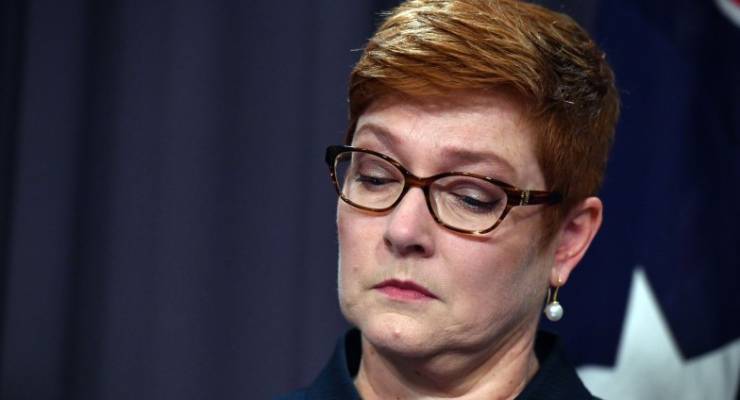
Australia’s muted response to continuing, massive anti-Beijing protests in Hong Kong has so far been understandable. After all, it was the Coalition government that failed in a 2017 attempt to ram through exactly the sort extradition treaty with China that triggered the massive protests against the Hong Kong government’s capitulation to Beijing.
Foreign Minister Marise Payne has been circumspect in addressing the issue on the direct threat to Hong Kong’s two systems guarantee.
“The Australian government believes it is important that any changes to Hong Kong’s extradition arrangements are pursued in keeping with regular processes of government and resolved in a way that fully respects Hong Kong’s high degree of autonomy and upholds the rights and freedoms enshrined in Hong Kong’s Basic Law under the ‘one country, two systems’ framework,” Payne said.
“The Australian Consul-General in Hong Kong has raised concerns about the proposed amendments at senior levels within the Hong Kong government and with the executive and legislative councils.”
Since then there’s been nothing more.
What is China playing at?
The protests in Hong Kong have been opening wider questions about China. Domestically, the promise of people-power is spooking Beijing almost exactly 30 years after the Tiananmen Square massacre. Outside China, the protests appear to be a major setback for Beijing’s plans to annex Taiwan.
Many observers see the support for Hong Kong by Taiwan’s president Tsai Ing-wen, whose Democratic People’s Party suffered setbacks in midterm local elections, as the key factor in her resurgent popularity that saw her re-endorsed for a second term in next January’s elections. Pro-Beijing candidates in the opposition Kuomintang have been striving to temper their enthusiasm for the Chinese government ahead of their own primary.
Even more, the protests and the problems they highlight are a further warning for countries flirting with greater legal cooperation with China. On June 10, New Zealand blocked a murder suspect’s extradition to China, with NZ Justice Minister Andrew Little saying the country had to examine “the extent to which the judiciary is subject to political control”.
What’s Morrison’s been saying?
The growing influence of Beijing in Hong Kong’s affairs has been mirrored in similar activities in Australia. Yet in Morrison’s first major foreign policy speech since his election, addressed this week to AsiaLink and Bloomberg in Hong Kong, it conspicuously did not rate a mention. This has underscored the government’s difficulty in handling the China trade/security balance — no easy task.
That glaring omission aside, the speech is deserves some attention in that it indicated Morrison to be quite determined to tread the same line as his predecessor Turnbull: hitching Australia’s security future to the United States while playing a firm hand with China while leaving the door open to constructive engagement.
Regarding China, Morrison said that the government is “determined that our relationship not be dominated by areas of disagreement”.
The decisions we make in relation to China are based solely on our national interests, just as theirs are towards Australia, and these are sometimes hard calls to make. But they are designed always to leave large scope for cooperation on common interests and recognise the importance of China’s economic success. This success is good for China, it is good for Australia.
Perhaps the most interesting piece of Morrison’ speech was a focus on intellectual property not before seen from an Australian government — new and worthwhile ground that should be welcomed by the business community.
“The US believes that the rule-based trading system in its current form is not capable of dealing with China’s economic structure and policy practices,” Morrison said. He said the government considers these concerns legitimate, including complaints about forced technology transfers, intellectual property theft and industrial subsidies that promote over-production.
It will be interesting to see if the government puts its money where its mouth is and puts these concerns front and centre in upcoming regional trade deals that include China.
Will we see Australia’s attempt to balance the US and China challenged? Send your thoughts along with your full name to boss@crikey.com.au








Let us assume that when Australia was granted independence from Britain, the British decided to keep Tasmania for 99 years. At the end of 99 years, the UK said: “you can have Tasmania back, but you have to wait several decades before it is truly reunited with the rest of Australia.” Would we accept that condition? I suspect not, and protests by the former colonial power would rightly receive scant consideration. Why should Hong Kong be any different? What we are witnessing are the last vestiges of colonialism and China should no more tolerate that than Australia would tolerate the former colonial power hanging onto Tasmania.
A much better analogy for China’s behavior towards Hong Kong is that it would be similar to Britain trying to abolish the Scottish parliament and bringing Scotland back under England’s rule.
Exactly
If you want to know what politicians really think, ignore their words (they have no shame and words are cheap) – watch their actions.
We can hardly complain, as we’d only be showing our hypocrisy in not calling out Assange’s extradition farce.
As if the Coalition would dare to cross their sponsors and brown paper bag commie mates.